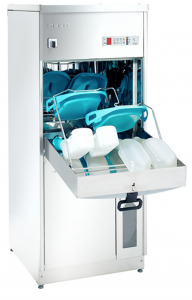
Safety has always been a priority in care and nursing homes. However, the pandemic has brought hygiene and infection control to the forefront of many people’s minds, and nursing homes have had to respond quickly and effectively.
 Residential care is at high risk of large infection outbreaks. This includes infections such as influenza and norovirus as well as coronavirus. Most care home residents are elderly, making them vulnerable to infection. This is why all hygiene precautions must be followed.
Residential care is at high risk of large infection outbreaks. This includes infections such as influenza and norovirus as well as coronavirus. Most care home residents are elderly, making them vulnerable to infection. This is why all hygiene precautions must be followed.
In December, the government announced it was providing an extra £60 million to protect the care sector. This extra money may be used for new equipment and staffing. But, the Adult Social Care Winter Plan reminds us all that good infection prevention and control practice is essential, so let’s remind ourselves of what that means.
Hand Hygiene
The most effective way of preventing infections from spreading is to have clean hands. Hands should be washed:
- Before you help a resident
- Straight after you’ve finished with a patient
- Immediately after being exposed to any bodily fluids
- Straight after touching a resident’s objects or surroundings
- Immediately after removing protective gloves
PPE
Wearing the correct PPE, including gloves and aprons, reduces the risk of infection when providing care to people.
When using PPE, you need to remember:
- Only wear each item once
- Have PPE in convenient places for staff to get easily
- Only put on gloves immediately before providing care and remove straight after
- Change gloves between tasks when caring for one person
- Change gloves when caring for a different patient
- Dispose of all used PPE safely and correctly
Ventilation
- Many infections, including Covid, spread quickly in unventilated rooms. Keeping areas well ventilated can keep residents and staff safe.
- Have bedroom windows open when residents are not in there
- Keep communal area windows open and provide extra blankets for residents
- Make sure you air visitor areas between different visitors
Layout
How a care home is set up can significantly reduce the risk of infection breakouts.
- Designate rooms for specific activities such as visiting
- Make creative use of outdoor and garden spaces
- Use different entrances for different people
- Keep areas uncluttered, so proper cleaning can take place
Cleaning
- Infections can spread from contaminated surfaces. This is why having a robust and regular cleaning process is vital.
- Make sure you have a designated lead for cleaning and decontamination
- Have cleaning schedules for staff to follow
- Remember to regularly clean high touch areas such a light switches, keyboards and door handles
- Have a system in place where staff know what level of cleaning is required and all cleaning is recorded
Waste Disposal
Human waste or bodily fluids like urine, faeces, vomit or sputum can carry pathogens that may spread if not disposed of correctly.
- Always wash hands immediately after exposure to any bodily fluid
- Use PPE when handling bodily fluids
- Use a bedpan washer to ensure human waste is disposed of correctly and bedpans and urine bottles are safe to reuse
Improve your Infection Control Procedures
If you’re using reusable items such as bedpans and urine bottles, you should also have a washer disinfector to clean them. Bedpan washers are the safest way to clean contaminated items. They also save you time, meaning staff have more time to care for residents.
Washer disinfectors give you complete peace of mind and enhance your infection control procedures.
If you are looking to upgrade your machine or are interested in purchasing your first washer disinfector, we can help.
Take a look at our online catalogue or call us on 0161 483 7333 to find out more.

